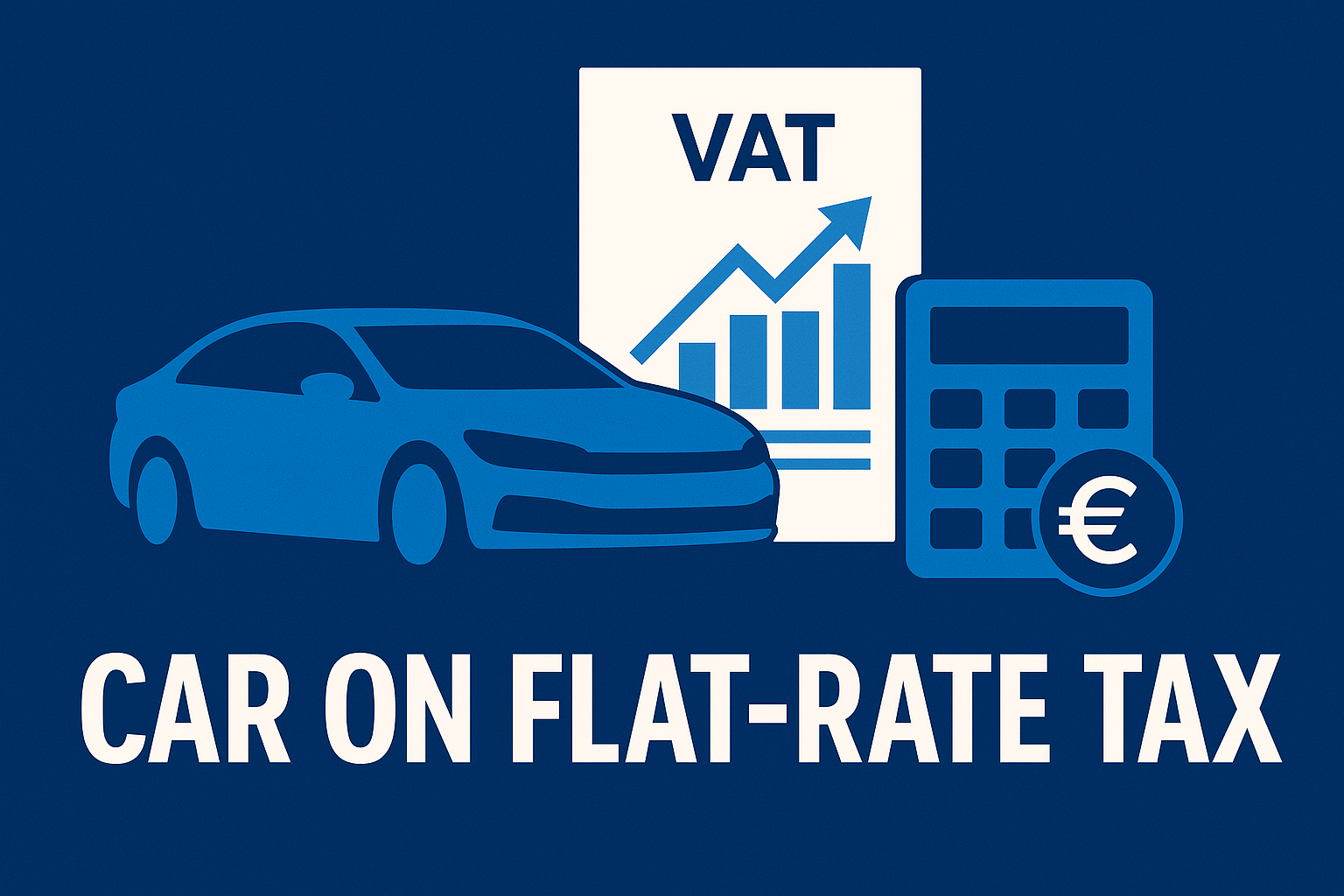Car on Flat-Rate Tax: VAT Deductions, Corrections and When It’s Better to Keep Your Car as Private Property
Running your own sole proprietorship often raises the question: is it worth buying a car for your business, and what are the tax consequences? For entrepreneurs taxed with a flat-rate on revenue, the issue is especially important—both the way you deduct VAT on purchase and how you settle VAT when you sell or withdraw the vehicle can significantly affect your total investment cost.
1. VAT Deduction on Car Purchase
- 50% VAT deduction applies when a passenger car serves both business and private purposes. In practice, half of the VAT on the invoice enters your deductible expenses; the other half remains non-deductible.
- 100% VAT deduction is possible if the car is used exclusively for business (no private use) and all three of the following conditions are met:
- You register the vehicle on form VAT-26.
- You implement an internal company car-use policy.
- You maintain a mileage logbook for VAT purposes.
Note for flat-rate taxpayers: If you’re not registered as an active VAT taxpayer, you cannot deduct VAT on purchase. Consider registering for VAT only if you plan serious business use of the vehicle.
2. VAT on Car Sale – Output Tax & Positive Correction
When you sell a car used in your business and you had any right to deduct VAT at purchase (50% or 100%), the sale is a VAT-able transaction (23%). Moreover, you must make a positive correction to your input VAT, reclaiming VAT for the unused portion of the correction period.
Example of a VAT-increasing correction on sale:
- Purchase price (gross): 61 500 PLN.
- VAT on purchase invoice: 11 500 PLN.
- You originally deducted 50% of VAT → 5 750 PLN.
- Total correction period: 60 months (5 years).
- Sale after 21 months → 39 months of correction remain.
- Monthly correction amount = 5 750 PLN ÷ 60 = 95,83 PLN.
- Additional VAT reclaimed = 95,83 PLN × 39 = 3 737,37 PLN.
After applying that correction, you issue a sales invoice with 23% VAT calculated on the net sale price.
3. Withdrawing the Car from Business – Input VAT Correction
You may choose to withdraw the car from your business and designate it entirely for private use. If this happens before the end of the correction period, you must reverse (correct) part of the VAT you previously deducted:
- Initial value ≤ 15 000 PLN – you correct if you withdraw within 12 months of putting the car into service.
- Initial value > 15 000 PLN – the correction period lasts 60 months from the month of putting into service; withdrawing earlier triggers a proportional correction.
Example (value > 15 000 PLN):
- Same numbers as above: you deducted 5 750 PLN VAT.
- Correction period: 60 months; withdrawal after 21 months → 39 months remain.
- Monthly correction: 95,83 PLN.
- VAT to reverse = 95,83 PLN × 39 = 3 737,37 PLN.
Thus, upon withdrawing the car for private use, you “return” 3 737,37 PLN of VAT.
4. Income Tax on Sale & Withdrawal – 3% Flat-Rate
Entrepreneurs taxed by the flat-rate on revenue must also apply a 3% flat-rate income tax to the entire revenue from selling the vehicle—or from “self-leasing” their private car to the business if they withdraw it from their business assets.
5. 50% VAT Deduction on Operating Costs of a Private Car
Even if you do not introduce the car into your business assets and you do not deduct VAT on its purchase (the car remains private), you are still entitled to 50% VAT deduction on all operating expenses for a car used in your business. That means you can reclaim half of the VAT paid on invoices for:
- Fuel
- Service and repairs
- Insurance
- Other parts and services related to the car
This approach lets you benefit from half of the VAT on your ongoing car costs without the formalities of VAT-26 registration, logbook-keeping, or the risk of long-term VAT corrections.
Conclusion
For flat-rate taxpayers, buying a car through the business can carry significant risk: you can’t claim depreciation or other costs directly, and stretching out VAT deductions over years—plus mandatory corrections or VAT on sale—often proves unprofitable. In many cases, using a private car (while reclaiming 50% VAT on expenses) or registering for VAT only if you truly need full deductions is simpler, safer, and more cost-effective.
